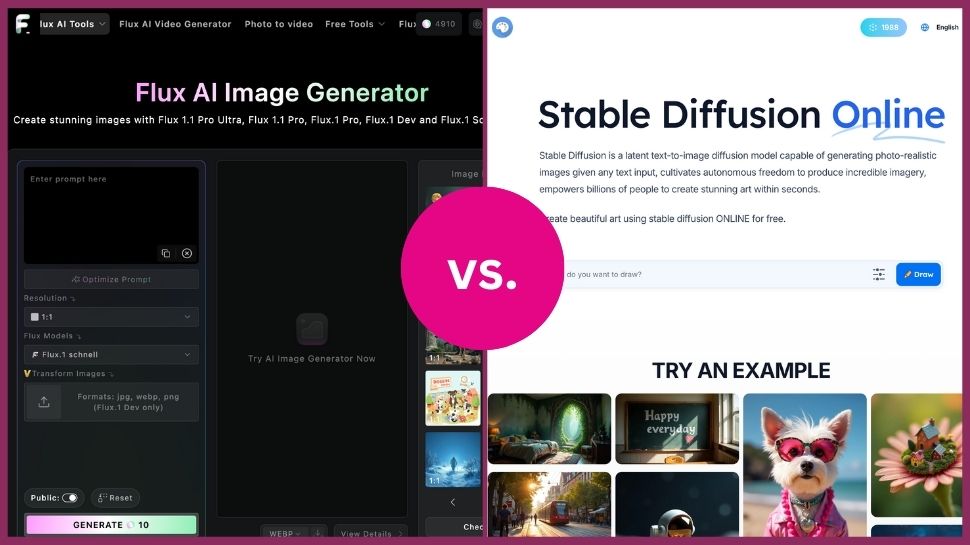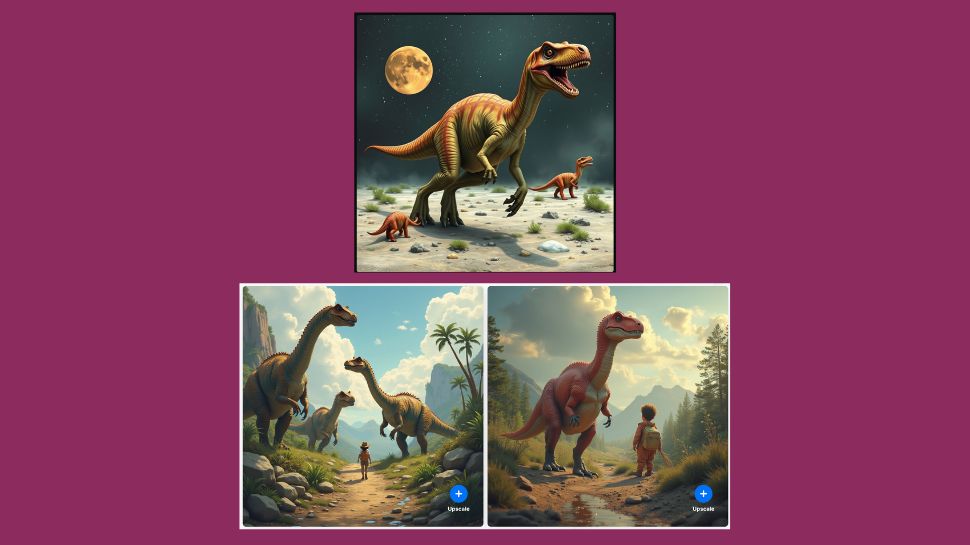
Stable Diffusion is a big name in the AI image generation game, so if you’re not looking for popular AI chatbots like ChatGPT and Gemini to create your content for you, you might be looking at this as an alternative solution.
However, there’s a growing number of startups and alternatives looking to have a slice of the pie, and Flux is well worth considering for its speed, efficiency and overall effectiveness.
The tests
We put together a series of five prompts designed to showcase what Flux and Stable Diffusion can do, along with a few hurdles to trip them up and uncover their weaknesses.
The prompts include a familiar fictional character doing an expected action; another expected action this time being performed by real humans; a slightly more obscure prompt with a standout adjective to steer the AI, an animal doing an unlikely action; and a broader prompt that gives the AI more freedom.
“Create an image of the tooth fairy taking a tooth from under a pillow”

Let’s address the elephant in the room, because neither Flux nor Stable Diffusion was able to generate an image of the tooth fairy taking a tooth from under a pillow – exactly what we’d asked for.
The two artificial intelligence systems attempted to illustrate the tooth fairy and teeth in a variety of form factors, but the specific prompt had not been handled.
That being said, Stable Diffusion’s second image was the best of all the outputs, so that’s where our points go, even though it took the best part of 38 seconds to handle our request.
Flux 11.46s
Stable Diffusion 37.97s
Flux 0 - Stable Diffusion 1
“Depict an office full of desk workers”

It doesn’t get much simpler than this. It’s the sort of image we see all across the internet, from studies and reports to royalty-free image sites.
Both captured the feeling of an office environment well, making it look busy and noisy, exactly how you’d expect an office to be.
After a poor start, Flux and Stable Diffusion both deserve recognition for their outputs, but Flux takes the lead for its quick production – Stable Diffusion took three times as long.
Flux 11.7s
Stable Diffusion 36.01s
Flux 1 - Stable Diffusion 0
“Create a serene illustration of a babbling brook”

We were just as pleased with the results from this test, with both systems creating images based on our prompt with ease.
Stable Diffusion’s pair of responses didn’t offer a huge variation – two totally different images or one image in half the time would’ve been preferred.
The quicker processing time and the sharper detail of Flux’s image give it first prize again.
Flux 11.60s
Stable Diffusion 37.78s
Flux 1 - Stable Diffusion 0
“Make a lifelike image of an armadillo swimming”

We may as well copy and paste our summary of the third test, because the fourth test rendered similar results.
Flux’s image combines a cartoon-like armadillo with what seems to be an image of a riverbed. We prefer the results from Stable Diffusion, but it’s a shame that it took an eyewatering 40 seconds.
Flux 11.48s
Stable Diffusion 40.48s
Flux 0 - Stable Diffusion 1
“Show me what it would be like to walk on earth with dinosaurs”

Waiting for Stable Diffusion to generate two images was painfully long, but it ultimately yielded better results, showing humans walking among dinosaurs – exactly what we asked for.
Flux generated a questionable image, with a miniature headless dinosaur included, but it didn’t include any humans to illustrate how it would be to walk among the ancient giants. It was much quicker, but ultimately, failed the task.
Flux 10.95s
Stable Diffusion 41.95s
Flux 0 - Stable Diffusion 1
Stable Diffusion vs. Flux: Which is best?
Flux 2 - Stable Diffusion 3
Although Stable Diffusion proved to be significantly slower than Flux, it generated more accurate images more of the time, leading to better results overall. That’s why, with a score of 3:2, it’s the winner of our showdown between these two AI image generators.
Flux is a much more efficient solution in terms of time usage, but don’t think cutting corners is worth a relatively small time saving, int eh grand scheme of how much time you’re likely to be spending on your entire project.
Do bear in mind that Flux is a more complete solution that gives you access to video generation tools, too.







